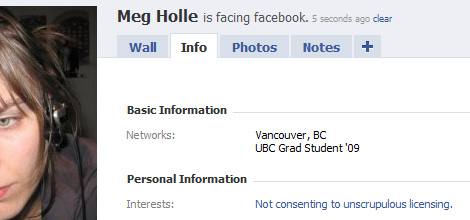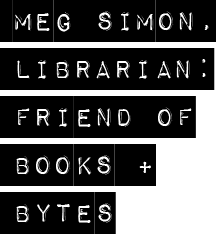
As most people reading this probably know, the latest Facebook debacle, as uncovered by The Consumerist, hinged not on their telling all your friends about what you thought were private transactions on completely unrelated sites, or hints of selling us off wholesale to market researchers. The onerous, out-of-no-where head-check this time comes from their updated Terms of Service (TOS), revised February 4 without user notification, which their TOS conveniently allows them to do.
The new license terms granted them the perpetual rights to all content a user posts or otherwise contributes to the site, even if a user later deletes that content or cancels an account. They also claimed control over content on a completely unrelated site if it contains a “Share Link,” a tool that helps readers post a link to that content on their Facebook page, if, you know, copying and pasting a URL is deemed too arduous. If that isn’t bad and bizarre enough, no one actually needs to click the link, ever, for the license to apply.
I currently have a “Share Link” -type service called AddThis on my personal blog, deepsicks, enabling a reader to easily bookmark and share the site (though not individual posts) with social link aggregators such as Reddit, Digg, StumbleUpon and yes, Facebook, along with a couple dozen others. This is how the internet works–through linking. Facebook essentially wants to turn a link into a license, thereby owning everything they touch or that touches them (and with their more than 175 million active users, you can bet that’s a lot). Even if they claim they would never enforce this in an unscrupulous way, the fact that the TOS language allows them to is deeply troubling if not outright outrageous. Because of my AddThis button, according to Facebook, they own my website. Forever.
I suppose this is the part where I should freak out and remove the link. I won’t. Not because I’m trusting or indifferent, but because I refuse to step light and wary around an entity that is trying to break the internet. What are they thinking, seriously? FB claims they would never use our content in a way we wouldn’t want them to, but for me they already failed that test with their “social advertising” nightmare-fest, Beacon. I have no reason to trust them to protect us from themselves, to have our best interests in mind. Why should they? Facebook is a business, and one using a precarious model—“free” for users, surviving off advertising dollars. I commend their success and innovation as a social networking site and certainly understand their desire to sustain themselves, as well as their need to have some licensing mechanisms in place so that they can offer their services at all. But I strongly oppose the direction they’re heading and especially the means by which they intend to get there.
Nothing a free service could “do to us” could be construed as “unfair”—unless it’s behind our backs without our consent, and that’s exactly what has happened (and not for the first time). The new TOS may not seem like a big deal, especially after they so quickly rescinded it—but this is presumably only because it got such bad press, not because they didn’t consider its implications beforehand. I’m starting to feel amphibious in this slowly boiling pot. These piecemeal incursions aren’t meant to dismay or horrify, only test our tolerance and inure us to and for progressively worse attacks on privacy and ownership.
No amount of PR backpedaling with a return to the previous TOS while they “sort things out” will cool my blood and persuade me to ignore my values and the premium I place on privacy. I have removed most personally identifying information and all original content from my profile with the exception of a single profile picture, wall posts, comments on links and photos that others have tagged of me. Facebook is a social networking tool, and that’s solely what I intend to use it for from now on. I suppose being really serious about my disgust would entail canceling my account, but I do find the service valuable for keeping in touch with the long tail and the occasional vegetative time-out. I have a website–two of them–where people can learn more about me through my writing and photography. Ironically, my main website, deepsicks, is released with a Creative Commons license. I gladly and freely give away my original, creative content–but I will not consent to having it taken away from me.
I see the occasional librarian / educator / student forum about Facebook and privacy, but I don’t think the discussion has been framed very well. Privacy is a lot more than “adjusting your settings” so your cousin can see your wacky, potentially illegal antics but not your parents or parole officer. Facebook and privacy is invariably conflated with two scenarios: Strangers will steal your identity or stalk you (though the latter is more of a FB benefit–showing off how awesome and fetching you are for potential equally awesome and fetching friends and flings). Or, the nebulous, nefarious “future employer” will look up your profile, see photos of you fantastically drunk / stoned / debauched / addicted to lolcats and/or spewing incoherent word salads in your 25 Things, and who in the office wants to put up with that? then toss your application in the shedder.
These are real concerns, surely. But what needs to be emphasized (by information professionals? irate bloggers? concerned citizens?) is the very territory Facebook would love to exploit. It won’t be fellow casual users invading your privacy, but Facebook itself, selling or otherwise allowing marketing companies and advertisers to use your information. Even if FB claims immunity, all the info is still right there. I can’t see FB lasting much longer without tapping into this further, willfully and blatantly–if they haven’t already, in ways unseen.
What unnerves me the most is some people—many people—don’t see this as a problem. Advertising has become an ingrained, habituated part of modern life, from entertainment to electioneering to self improvement and self expression. This could easily spin off into a ramble-rant, entire new post or post-grad thesis, but Facebook, “helping you connect and share with the people in your life,” in addition to being an enormous time-suck of human talent, is a mechanism for social normalization that helps us be good consumers of products and information—the latter to which FB just tried to claim perpetual ownership, the former which they are paid to make us want. I know a (small) handful of people who refuse to sign up, and they endure inane amounts of Facebook evangelism (shaming! begging! berating!), receiving multiple invitations from the same people frantic that their friendship doesn’t count if not part of the official FB tally, unable to conceive why one would choose not to conform.
“Free” is not free. Ever. I’ve seen some awe-inspiring and plain neat things resulting from social networking and internet mobilization, but that comes from the bottom up, not top down, and the powers that be, no matter what they say, will ultimately control which way the wind blows (unless, of course, everyone were suddenly to abandon it), especially as Facebook, victim of its own success, scrambles for a way to sustain itself.
For those who don’t agree, don’t won’t can’t see the forest for the trees, the writing on the wall, the meta in the metaphor, youall-drive-me-crazy and thisall-disturbs-me-deeply. But I shall continue to be suspicious on your behalf. I will fight for you when the crystal cracks.
